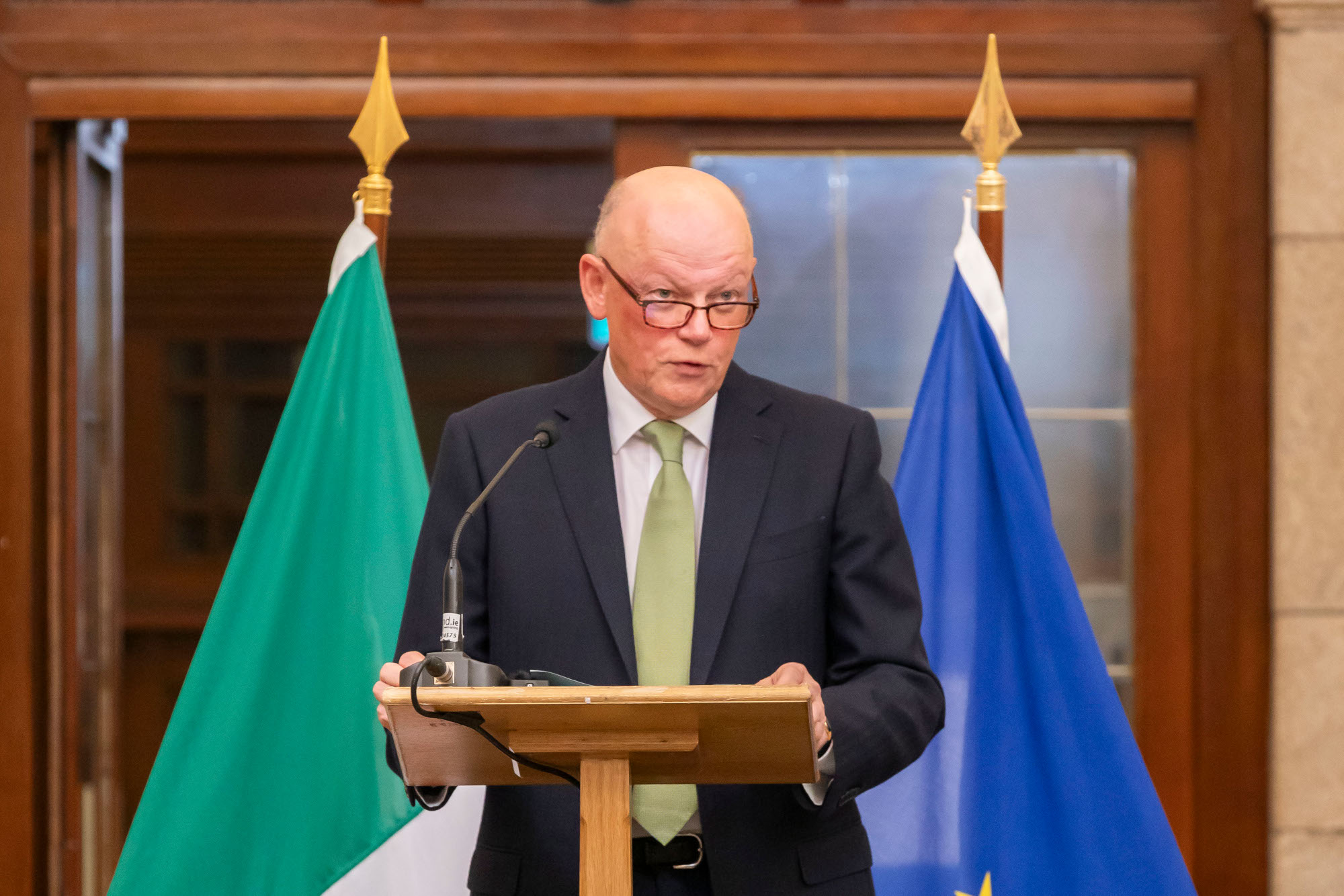Chief Justice urges more to speak out about court funding needs

Pictured: Chief Justice Donal O'Donnell delivering his address at the opening of the new legal year. (Credit: Cian Redmond)
The Chief Justice challenged lawyers and others involved in the justice system to speak out against “consistent underinvestment” in the Irish courts in his address marking the opening of the new legal year.
Mr Justice Donal O’Donnell delivered the annual address to hundreds of people, including senior judges from neighbouring jurisdictions, this morning in the Four Courts, where the ceremony has taken place for a second year.
Last year marked the first time that the occasion was marked with a secular ceremony rather than a religious one.
“I do not suggest that anything revolutionary occurred here last year, nor am I suggesting any change to the legal calendar, but there is a sense in which this can be said to be year two,” Mr Justice O’Donnell said at the beginning of his remarks.
He said the decision to move the ceremony to the Four Courts reflected “a growing unease, which I must say I shared, of the intertwining in Ireland of religion with an important branch of the government of the State which was established from the outset on republican principles and which has been, in name and reality, a republic since 1948”.
In his address, Mr Justice O’Donnell expressed concern about issues including the media, saying it appeared that the “routine day-to-day reporting of court cases, which used to be a staple diet of newspapers and other media, has significantly decreased”.
“This matters because research in our neighbouring and comparable jurisdictions shows that the more experience and knowledge the public has of the legal system, the greater their confidence in it,” he said.
“Constructive criticism is welcome, but there is also a corresponding obligation on those who would comment on or criticise the court system based on generalisations to recognise the limitations of the information available, and the significant constraints that are upon the courts in general, and individual judges in particular, and be fair.”
The chief justice also addressed changes in society, saying that “the pace of change, particularly in the last 20 or so years, has been extraordinary and dramatic”.
He said: “The population has increased significantly, become more diverse, law is becoming more elaborate and multi-layered, and litigation is correspondingly expanding, complex, and demanding.
“It is fair to say that, even if these changes were not occurring at their current pace, there would be significant challenges in seeking to administer justice in a system that was devised 100 years ago.”
However, the judge’s sharpest remarks were reserved for issues relating to funding — complaints which he said tended “in today’s climate” to be “heavily discounted or even completely ignored”.
Mr Justice O’Donnell said there had been “a century of persistent and consistent underinvestment in the courts system”.
This has been “not only in judicial numbers… but also in the ancillary staff required in order to support the operation of an efficient courts system, and in the type of physical infrastructure and IT facilities that would be regarded as standard in any business”.
He also said there was a “causal connection between investment in the court system and beneficial outcomes in terms of reducing waiting lists, delays and increased efficiencies, the quality of decision-making for all court users, and reducing the stresses on judges and court staff in the system”.
Pointing out that the annual budget for the courts and the judiciary “would keep the health service funding for less than a week and the education system for approximately a week or so”, he questioned whether funding for the justice system reflected its “essential function in the operation of the State”.
“An investment which would go unnoticed in other sectors of the State could have really significant benefit and an even transformative impact on the legal system,” he added.
He said there was a “generational opportunity to address this, to stand back and take a fresh look at the type of model of justice system that we wish to have”.
In a challenge to those present, Mr Justice O’Donnell said the issue was “not a matter of one speech by a chief justice or anyone else”, but “a matter for everybody who is here”.
“If it is true to say that the courts system has been grossly under resourced for decades, and requires a step change in the approach to its funding, and that increases in funding result in measurable improvements, then that is something which should be said not just by judges whose public utterances must be limited and measured,” he said.
“It should be said by everybody concerned in the justice system.”






